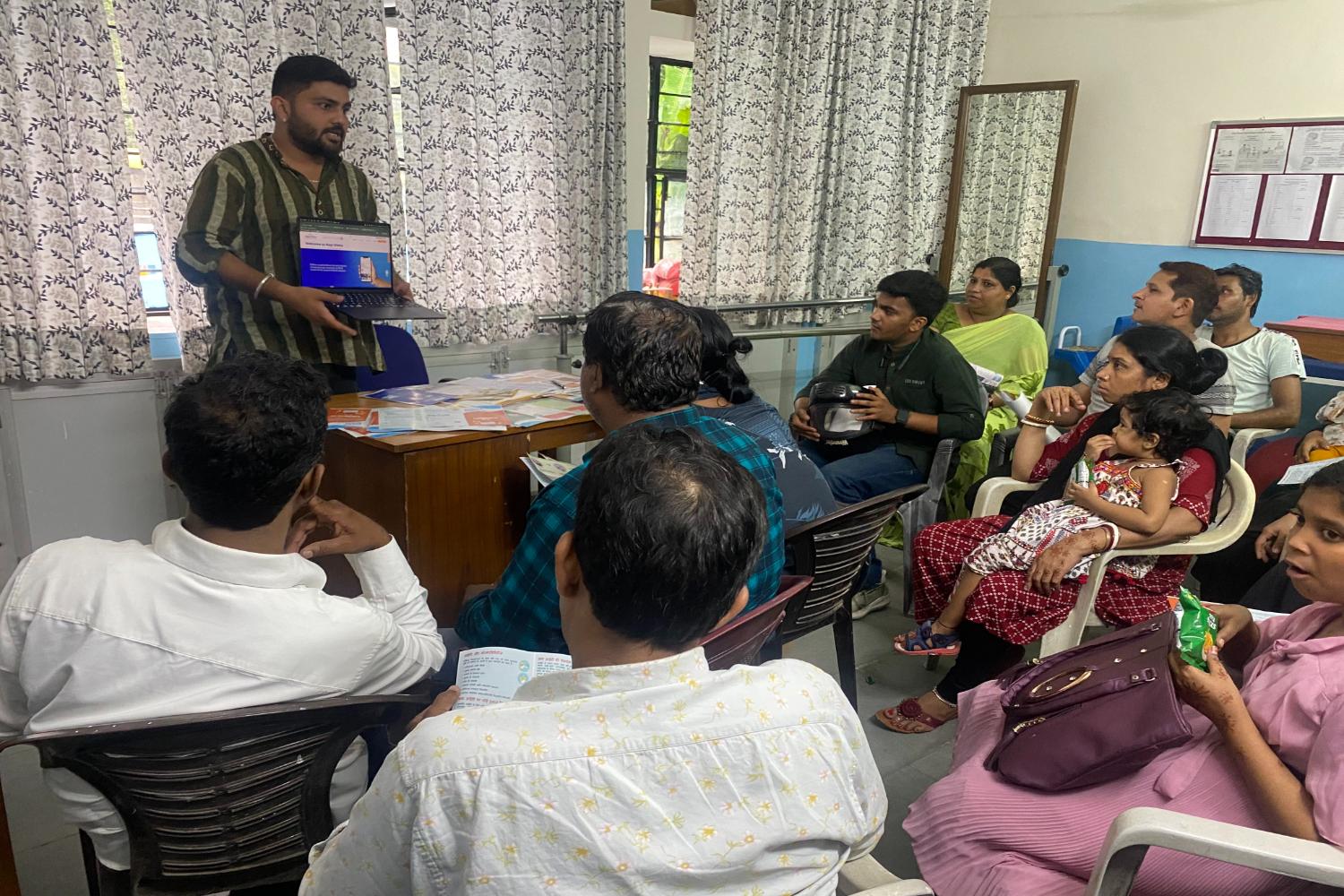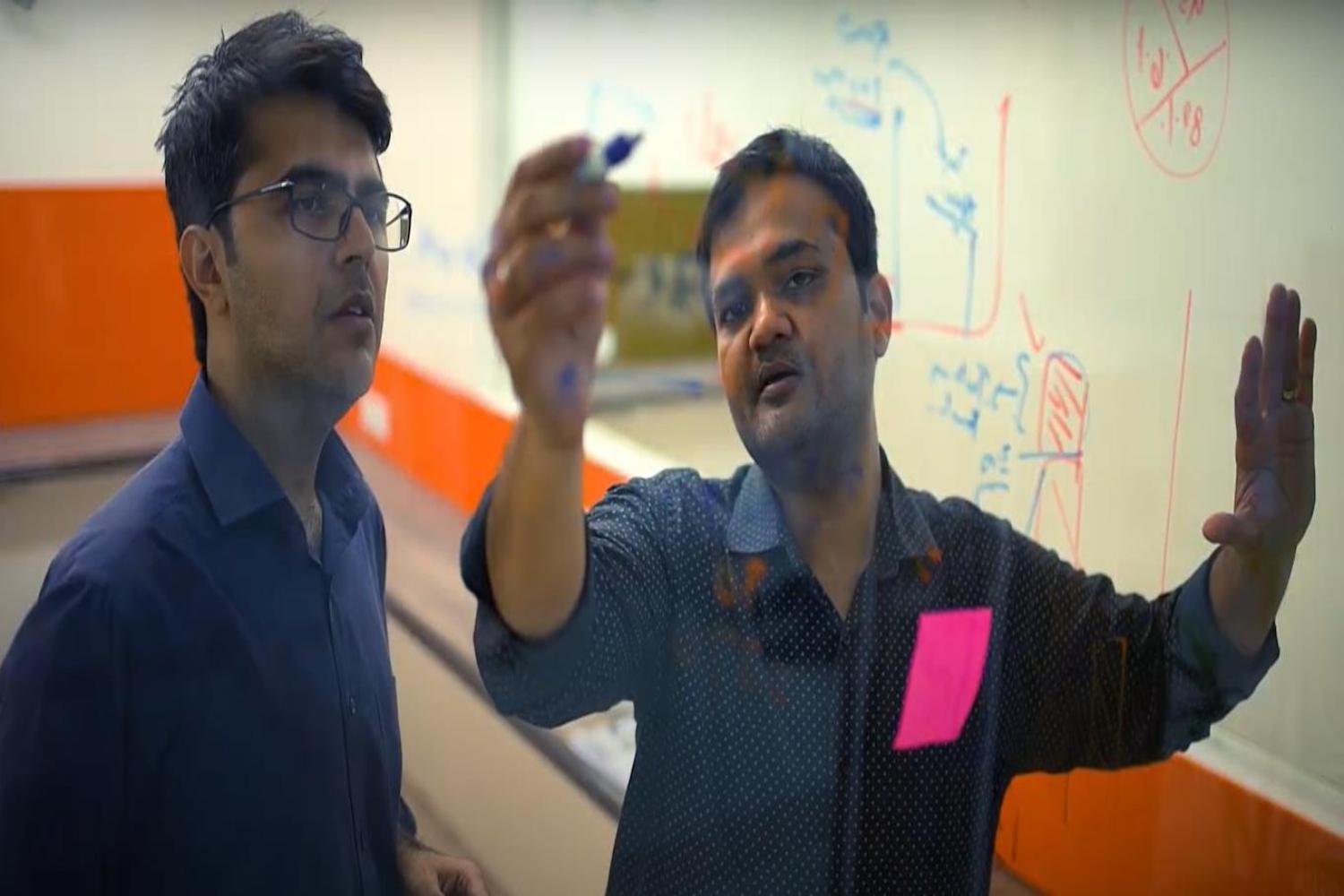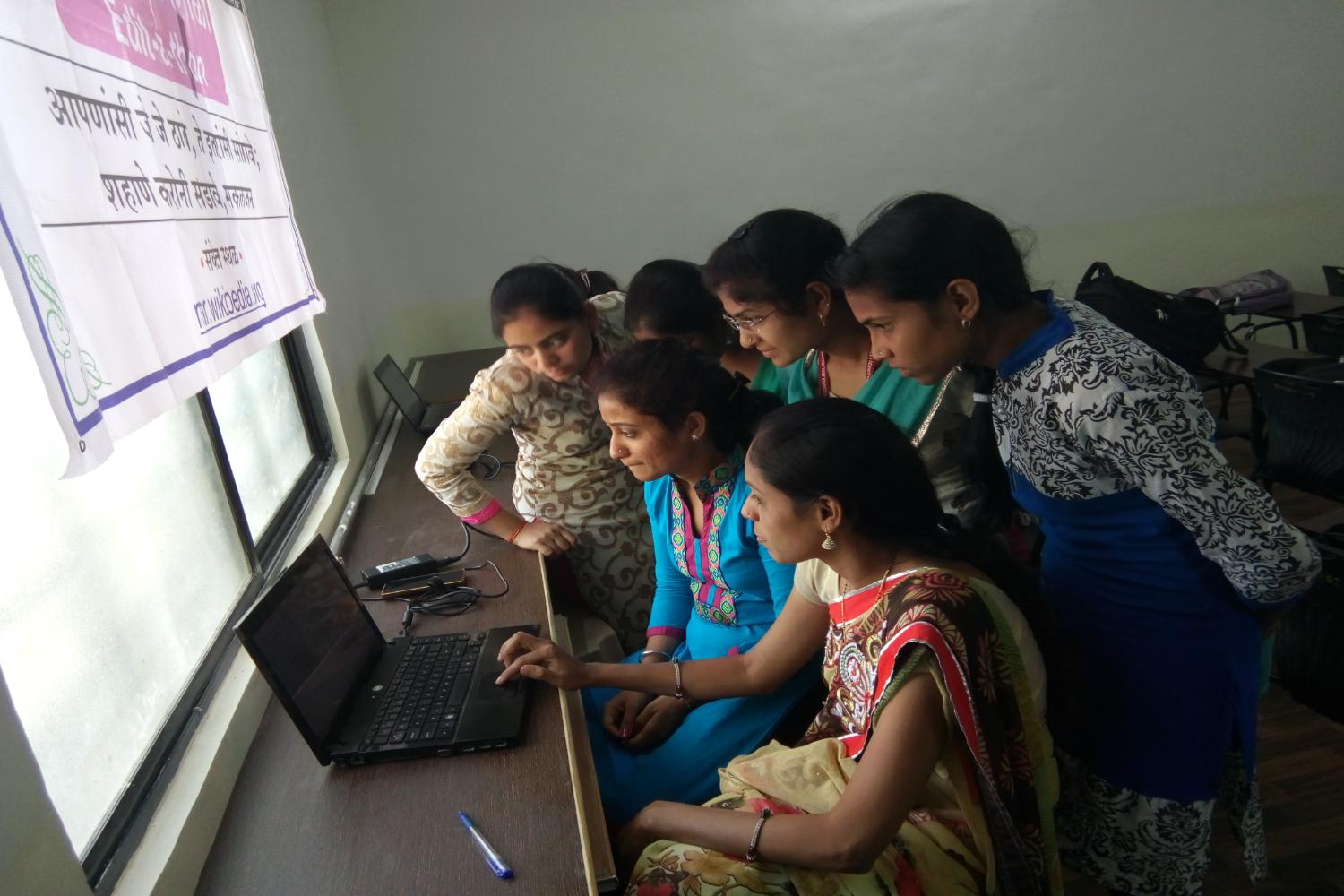Creating a supportive ecosystem for caregivers Engaging social resources with technology
share the modalities of building a support system for caregivers of children with intellectual and developmental difficulties, by enabling engagements between social resources and technology

In the remote town of Indrapur in Uttar Pradesh, Sandhya, the mother of a child with intellectual and developmental difficulties (IDDs), faced profound challenges when she encountered them in her child’s early years. The lack of awareness and guidance in her community led her to unverified solutions. This caused her to fall prey to deceptive quacks that drained her limited resources. Schools did not admit her child and she was left alone to provide him with round-the-clock care and support his development. As if this was not enough, the weight of societal judgment bore down. Her in-laws blamed her for her child’s condition. Her husband abandoned her, leaving her alone to care for her child.
As the incident shared above shows, families impacted by Autism, Down Syndrome, and other developmental disabilities struggle to find the right schools and services for their children who in many cases are non-verbal and unable to fend for themselves. They run pillar to post in search of verified information. They are often duped by quacks who promise them non-existent cures for their child’s condition.
The gap
Despite 50 million children at risk of developmental disabilities in India, there is a severe lack of awareness. Information is not easily available. Families needing information have no support. This leads to delayed diagnosis and reduced uptake of services, which are critical for the child’s development.
Families are, thus, unable to actively contribute to the child’s development. These challenges, distinct from those of physical disabilities, manifest as a lifelong journey of complex decision-making for parents. Unlike physical disabilities, these conditions affect the very core of their child’s cognitive and behavioral functioning. The impact on families is profound. They often find themselves navigating a lifelong journey of support and care.
Everyday decisions can be complex, from educational choices to healthcare and therapy options. Moreover, the challenge of fostering independence, while ensuring the safety and well-being of their child, is a constant concern. The emotional toll on parents is significant, as they strive to provide the best possible life for their child, while coping with the uncertainty and unique demands that come with developmental disabilities.
Moreover, finding the right professional to guide the family in the appropriate direction often becomes a tenuous activity. These professionals bring specialized expertise, offering tailored interventions addressing the unique needs of each child. These interventions can potentially address the everyday needs in the journey of the development of a child with intellectual and developmental disabilities.

A 2019 study shows India has only 5,000 occupational therapists₁ The challenges for a parent don’t stop here. The lack of awareness and abundance of common myths in the common populace hacks away at any sort of social support. This has become a major contributor to 50% of parents with children with disabilities facing severe psychological distress in India Along with the inadequate number of professionals, for parents like Sandhya living in non-metro locations, finding a professional for their children and a supportive and affirming social support system becomes a challenge In focus group discussions conducted by us with families in different parts of Hyderabad, they seemed to resonate with our understanding of the challenges involved. In their own words, families mentioned that the early years after any diagnosis were like a haze, almost like walking in the mist. In addition to the lack of timely and verified information, families also mentioned the isolation in the caregiving journey and the lack of social support.
To think of a platform sans technology (that would understand the gamut of challenges at a macro scale and help counter the daily challenges faced by families) would have been an arrow in the dark.
Why ICT?
Access to information is the starting point for any intervention. Considering the growing access to informational networks, it is imperative to include technology right from the beginning of our interventions in this space.
Futuristic solutions for scale: The statistics around internet penetration were 21% when we started with the idea. Today, the data indicates more than 50% internet penetration in India, with a prediction of 900 million users in the country by 2025. One workshop could reach 50-100 families at a time. However, a digital platform can reach families breaking geographical boundaries.
One-stop solution for verified information: To provide holistic support to parents and caregivers, the solution is required to be allen compassing. This means information about the condition, therapeutic know-how, and government schemes at every stage of their child’s development and information about available services with their contact details tagged by location and age-group.
Breaking mobility barriers: The caregiving needs of a child with a disability often bind the families at home. Discrimination and accessibility barriers in social spaces make it even harder for them to reach out for support. With ICT solutions, information can be brought to the fingertips of families from the comfort of their homes.
For parent like Sandhya, verified information, help at the fingertips and judgement-free support becomes important. It would help all those parents on a similar journey, if they have a support system walking with them in the journey of their child’s development.
Critical factors to consider while building an ICT solution
Accessibility, availability and acceptability are they key concerns at hand while building an IT solution. The internet penetration numbers can seem exciting on the surface. However, some ground realities must be accounted for while planning any intervention. Many households might have only one phone that can be accessed by the family after the male breadwinner returns home. Anytime access through ICT can ensure that families access information at their convenience. There has been a significant growth in accessing information. However, most seek infotainment through social channels such as YouTube, Instagram, WhatsApp and Facebook. Additionally, in a country as diverse as India, it is pivotal to provide information in the language of choice for the families. Family caregivers provide life-long support, and the journey can get isolating. Emotional support, and knowing that one is not alone, can help motivate families and provide a sense of belonging to the community. This is where WhatsApp community groups can play an important role .
The ICT solution to leave no family behind
Considering all the above factors, Nayi Disha developed a unique platform comprising a mobile progressive web application with verified information and resources, expert networks, and a multi-channel helpline available through WhatsApp chatbot. The platform acts as a repository for all the information to bridge the accessibility gap. Credible information is also being disseminated through all available social media platforms to build more awareness around IDDs. These include YouTube, Facebook, WhatsApp and Instagram.

Nayi Disha also hosts its support groups on WhatsApp to connect, share experiences, and offer mutual support. ICT has played a transformative role in enhancing these connections. It has made it easier for parents facing similar yet unique challenges to find one another. The resources of the website are also available in printed format for families that will not be able to access the internet. Technology remains core to our work. It is truly an enabler to help us reach families across the country. The following are the services available through the Nayi Disha platform.
Access to verified and curated information: 700+ published articles in English, Telugu and Hindi have been made available. These include crucial evidence-based information across life stages on Autism, Down Syndrome, and other developmental disabilities, regarding therapies, education, home management, and future planning. We have also translated the information resources into three languages – English, Hindi and Telugu. Through these translations, we have taken care to break the medical lingo and jargon into easy-to-understand snippets. The interventions have helped in reducing parents’ challenges.
Addressing the gap between professionals and families: An ecosystem of 4,800 providers of services required by children with Autism, Down Syndrome, and other conditions from 250 towns have been tagged on the platform, with geo-location. Parents can also provide feedback and reviews. Social support for families: The platform also has 28+ support groups based on location, conditions, and age group on WhatsApp.
Access to support through helpline: A competent team of special educators, counsellors, and social workers that cater to various queries on the phone and the chatbot. Since the inception of our Helpline in 2020, we have received 12,500+ queries to date. We have gotten one step closer to families and made our services more accessible for all parents through the WhatsApp chatbot integration
Training the parents to complement therapeutical intervention: Saksham is an offline and online 8-session parent training program in Hindi. It has been designed for parents of children aged 2 to 13 years. These modules address key areas like managing behavior, enhancing communication skills, ensuring child safety, and promoting awareness of parental rights. Parents are trained through these sessions to be empowered and self-sufficient, to provide necessary support to their children, and complement the impact of therapies.
Challenges faced
In the long run, technology stands as the most sustainable pathway for bringing transformative change to families with children with disabilities. While traditional methods of support and intervention are essential, ICT offers a scalable and enduring solution that transcends geographical barriers. However, there have been a few challenges along the way. We share these below.
Funding: Funding agencies have traditionally made grants for early childhood, early intervention, and mostly skilling-based initiatives, as far as developmental disabilities are concerned. For a long time, it was very difficult to convince the funders about the true impact of an ICT-based solution such as ours, and the need to invest in public goods, which can have long term implications. The COVID-19 pandemic underscored the potential impact of digital solutions and the role of caregivers in the disability inclusion space.
CSR focus: Funders and donors often hesitate to back tech-focused non-profits, when the impact isn’t immediately evident, as opposed to supporting other non-profits where qualitative data presents immediate results. While, for-profit tech companies invest heavily in building their ventures and typically maintain substantial teams, our challenge as a tech-based non-profit often revolves around remaining bootstrapped. Also, it’s not just about creating ICT solutions. These solutions also need to be supported with adequate effort on social media, search engine optimization, and search engine marketing to improve the uptake of the platform. This requires constant effort and financial support to do so.
Technology talent for non-profits: It is practically impossible for non-profits to hire technology talent, as non-profits cannot compete with the corporate salaries of technology firms. This was, and remains, an ongoing concern. However, a lot of social good entrepreneurs have started initiatives that specifically support the technology needs of non-profits, which makes us hopeful.
In conclusion
Through digital platforms, families can access specialized resources. They can also connect with support networks and acquire valuable knowledge and skills. All of these empower them to provide ongoing, tailored care for their children.
Moreover, digital advocacy and awareness help in spurring societal shifts that recognize and accommodate the unique needs of individuals with disabilities. This technology driven empowerment improves the immediate well-being of these families. It also ensures a sustainable and inclusive future where every child can thrive, regardless of their abilities.
Today Nayi Disha has reached 4,50,000 people through the platform. It has a community of 30,000 families that have availed various Nayi Disha services through the varied channels. We believe that the unique marriage of technology and community has helped us at Nayi Disha to reach families and parents with the support that they deserve.
Sandhya is one such parent. She discovered “Nayi Disha” with new hopes. Although early intervention opportunities had passed, the counsellors at Nayi Disha’s helpline provided emotional support. They also connected her with knowledgeable professionals, leading to her child’s’ diagnosis of Autism. Through Nayi Disha’s WhatsApp support group, Sandhya found solace in the company of parents who shared a similar journey as hers. She learned valuable techniques to cater to her child’s unique needs, though the question of her child’s future after her remained uncertain. Sandhya’s story underscores the resilience
of a mother, the power of community, and the transformative impact of ICTs, illuminating a path of hope and determination in the face of adversity.
End notes
- Murthi, K.M., 2019. “Evolution of occupational therapy practice in India: an overview of the historical foundation and current practice.” Annals of International Occupational Therapy, 2(3), pp.141-148.
- Pruthi, G.K., 2021. “A Study of care giver’s burden in parents of children with specific
learning disability.” International Journal Indian Psychology, 9(2).




No approved comments yet. Be the first to comment!